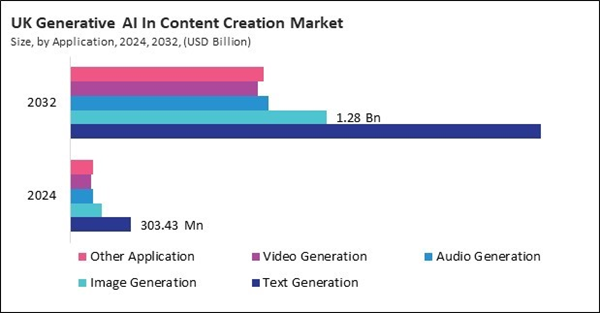The Germany market dominated the Europe Generative AI In Content Creation Market by country in 2024, and is expected to continue to be a dominant market till 2032; thereby, achieving a market value of $7.08 billion by 2032. The UK market is exhibiting a CAGR of 30.3% during 2025-2032. Additionally, the France market is expected to experience a CAGR of 32.7% during 2025-2032.
An emerging trend is the expansion of multimodal generative AI systems that can simultaneously handle text, image, audio, and video generation. This convergence is fostering the development of holistic content solutions where a single model can script a video, generate appropriate visuals, synthesize voiceovers, and compile everything into a ready-to-publish format. With the rise of immersive technologies like AR and VR, generative AI is also being leveraged to create dynamic and interactive environments for virtual storytelling and gaming.
Competition in the generative AI content creation market is intensifying as established tech giants, startups, and niche AI developers vie for dominance. Large corporations with substantial R&D capabilities are investing heavily in foundational models and expanding their capabilities to cover a broader spectrum of content types. Simultaneously, startups are focusing on specialized applications such as AI copywriting, podcast scripting, and generative design.
Germany stands at the forefront of Europe's Generative AI in Content Creation market, leveraging its robust industrial base, strong research infrastructure, and commitment to ethical AI development. The country's National AI Strategy, launched in 2018, aims to position Germany as a global leader in AI by fostering innovation, ensuring ethical standards, and promoting AI applications across various sectors. The German government has committed substantial funding to AI research, focusing on integrating AI into industries such as manufacturing, healthcare, and media. This strategy emphasizes collaboration between academia, industry, and government to drive AI advancements.
The United Kingdom has established itself as a significant player in the this market, leveraging its robust creative industries, supportive government policies, and a dynamic startup ecosystem. The UK's National AI Strategy, introduced in 2021, outlines a comprehensive plan to position the country as a global leader in AI innovation. This strategy emphasizes the importance of AI in driving economic growth, enhancing public services, and addressing societal challenges. A key factor influencing the UK's Generative AI market is the government's commitment to fostering AI research and development.
France has positioned itself as a leader in the development and application of artificial intelligence (AI), with a particular emphasis on generative AI technologies in content creation. The nation's commitment to AI is evident through its National Strategy for AI, which was initiated in 2018 and further reinforced under the "France 2030" plan. This strategy aims to make France a global hub for AI by investing in research, fostering innovation, and ensuring ethical use of AI technologies. A significant aspect of France's AI strategy is its focus on integrating AI into various sectors, including media, culture, and the creative industries.
Russia has been actively pursuing advancements in artificial intelligence, with a particular focus on generative AI applications in content creation. The country's National Strategy for the Development of Artificial Intelligence, unveiled in 2019, aims to position Russia as a global leader in AI by 2030. This strategy emphasizes the development of AI infrastructure, fostering education in AI-related fields, and integrating AI into key sectors such as defense, healthcare, and the economy. Despite facing challenges such as international sanctions and limited access to advanced technologies, Russia has made significant strides in developing domestic AI capabilities. Hence, Europe's leading nations are advancing generative AI in content creation through strategic investments, ethical frameworks, and sector-wide integration, reinforcing their global competitiveness in AI innovation.
List of Key Companies Profiled
- Adobe, Inc.
- Autodesk, Inc.
- Coherent Corp.
- Google LLC (Alphabet Inc.)
- Jasper AI, Inc.
- Microsoft Corporation
- NVIDIA Corporation
- OpenAI, LLC
- Samsung Electronics Co., Ltd. (Samsung Group)
- CopyAI, Inc.
Market Report Segmentation
By Component
- Software
- Services
By Application
- Text Generation
- Image Generation
- Audio Generation
- Video Generation
- Other Application
By Industry
- Entertainment & Media
- Marketing & Advertising
- E-commerce
- Healthcare
- Other Industry
By Country
- Germany
- UK
- France
- Russia
- Spain
- Italy
- Rest of Europe
Table of Contents
Companies Mentioned
- Adobe, Inc.
- Autodesk, Inc.
- Coherent Corp.
- Google LLC (Alphabet Inc.)
- Jasper AI, Inc.
- Microsoft Corporation
- NVIDIA Corporation
- OpenAI, LLC
- Samsung Electronics Co., Ltd. (Samsung Group)
- CopyAI, Inc.









